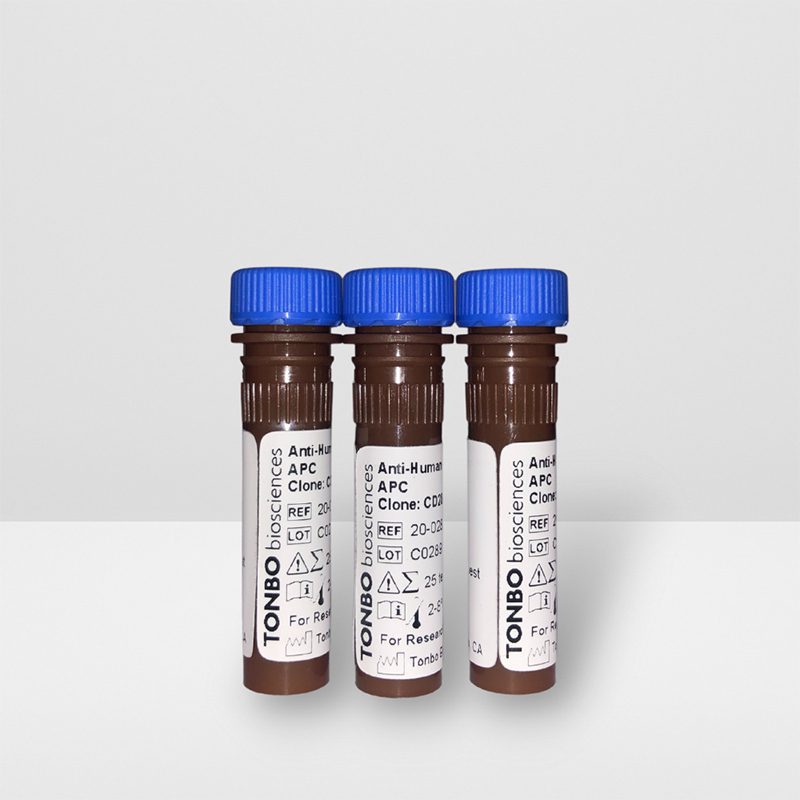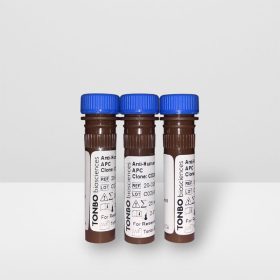Product Description
The PC61.5 antibody is specific for mouse CD25, a 55 kDa surface protein also known as the Interleukin-2 Receptor alpha chain, or IL-2R alpha. CD25 may bind IL-2 by itself, although with low affinity and without induction of cell signaling. CD25 is also expressed within a high-affinity complex, along with the IL-2R beta chain (CD122) and the common gamma chain (CD132), to form a signaling receptor complex. Expression of CD25 varies during developmental stages of T and B cells, is induced on activated mature T and B cells, and is present on subsets of dendritic cells. CD25 signaling as part of the IL-2 receptor complex triggers T cell activation and proliferation, as well as modulating the differentiation and function of Th17 cells, T regulatory (Treg) cells, and dendritic cells.
The PC61.5 antibody is used as a marker for T cells, B cells and dendritic cell subsets. Expression of CD25, CD4 and the transcription factor Foxp3 is regarded as a phenotypic signature for Treg cells. As such, this antibody is widely used for depletion of Treg cells in vivo, as well as to distinguish Treg cells from naïve or conventional T cells which are CD25-.
Product Details
| Name | In Vivo Ready™ Anti-Mouse CD25 (PC61.5) |
|---|---|
| Cat. No. | 40-0251 |
| Alternative Names | Interleukin-2 Receptor alpha, IL-2Rα, Ly-43, p55, Tac |
| Gene ID | 16184 |
| Clone | PC61.5 |
| Isotype | Rat IgG1, lambda |
| Reactivity | Mouse |
| Cross Reactivity | |
| Format | In Vivo Ready™ |
| Application | Flow Cytometry, Functional Assays, IHCF, IP |
| Citations* | Liang D, Zuo A, Shao H, Born WK, O’Brian R, Kaplan HJ, and Sun D. 2012. J. Immunol. 188: 5785-5791. (in vivo blocking)
Yu P, Steel JC, Zhang M, Morris JC, Waitz R, Fasso M, Allison JP, and Waldmann TA. 2012. Proc. Natl. Acad. Sci. 109:6187-6192. (in vivo Treg depletion) Billiard F, Lobry C, Darrasse-Jeze G, Waite J, Liu et al. 2012. Blood. 119: 4656-4664. (in vivo Treg depletion) Tang S, Moore ML, Grayson JM and Dubey P. 2012. Cancer Res. 72: 1975-1985. (in vivo Treg depletion) Lee L-F, Logronio K, Tu GH, Zhai W, Ni I, Mei L, Dilley J, Yu J, et al. 2012. Proc. Natl. Acad. Sci. 10.1073. (Flow cytometry). 10F.9G2, J43, PC61 Koehn BH, Ford ML, Ferrer IR, Borom K, Gangappa S, Kirk AD, and Larsen CP. 2008. J. Immunol. 181:5313-5322. (in vivo blocking) Leithauser F, Meinhardt-Krajina T, Fink K, Wotschke B, Moller P and Reimann J. 2006. Am. J. Pathol. 168(6): 1898-1909. (Immunohistochemistry – frozen tissue) Hashimoto N, Nabholz M, MacDonald HR, and Zubler RH. 1986. Eur. J. Immunol. 16(3): 317-320. (Blocking) Ceredig R, Lowenthal JW, Nabholz M, and MacDonald R. 1985. Nature. 314:98-100 (Immunohistochemistry) Lowenthal JW, Zulber RH, Nabholz M, and MacDonald HR. 1985. Nature. 315(6021): 669-672. (Immunoprecipitation, Blocking) |
Application Key:FC = Flow Cytometry; FA = Functional Assays; ELISA = Enzyme-Linked Immunosorbent Assay; ICC = Immunocytochemistry; IF = Immunofluorescence Microscopy; IHC = Immunohistochemistry; IHC-F = Immunohistochemistry, Frozen Tissue; IHC-P = Immunohistochemistry, Paraffin-Embedded Tissue; IP = Immunoprecipitation; WB = Western Blot; EM = Electron Microscopy
*Tonbo Biosciences tests all antibodies by flow cytometry. Citations are provided as a resource for additional applications that have not been validated by Tonbo Biosciences. Please choose the appropriate format for each application and consult the Materials and Methods section for additional details about the use of any product in these publications.








